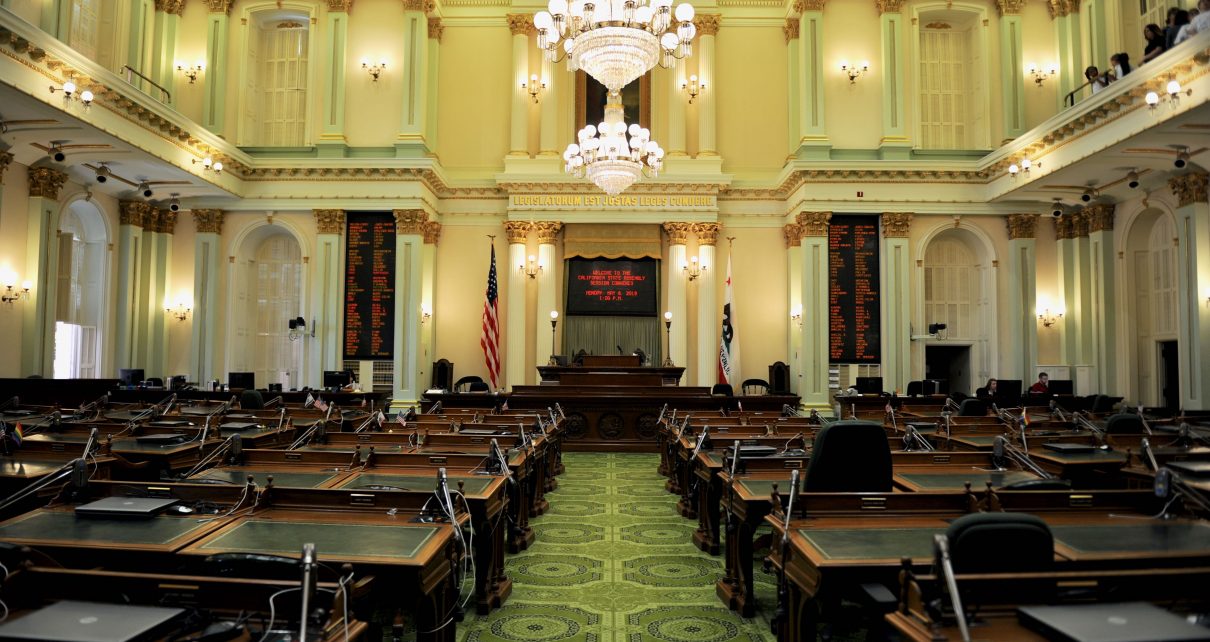
California Assembly Chambers. (Photo: Kevin Sanders for California Globe)
Provisions of Article IV that Capitol Insiders Should Know
No bill can be passed unless the bill is in its final form for at least 72 hours before the vote
By Chris Micheli, September 11, 2024 1:00 pm
California’s Constitution, like its federal counterpart, provides for the three branches of state government. Article IV deals with the legislative branch of California government. This article highlights the major provisions of Article IV that those working in and around the State Capitol should know.
Section 1 – Legislative Power Is Shared
“The legislative power of this State is vested in the California Legislature which consists of the Senate and Assembly, but the people reserve to themselves the powers of initiative and referendum.”
Section 2 – Composition of the Legislature; Term Limits; Election Date; Vacancies
The Senate has 40 Senators elected for 4-year terms, with 20 Senators to begin every 2 years, while the Assembly has 80 members elected for 2-year terms. The terms of a Senator or a Member of the Assembly commence on the first Monday in December next following her or his election. During her or his lifetime, a person may serve no more than 12 years in the Senate, the Assembly, or both, in any combination of terms. The election of legislators takes place on the first Tuesday after the first Monday in November of even-numbered years unless otherwise prescribed by the Legislature. When a vacancy occurs in the Legislature, the Governor immediately calls an election to fill the vacancy.
Section 3 – Convening of Regular and Special Sessions; Adjournment
The Legislature convenes in regular session at noon on the first Monday in December of each even-numbered year. The first order of business is to “immediately organize.” Each session of the Legislature adjourns at midnight on November 30 of the following even-numbered year. On extraordinary occasions the Governor by proclamation may cause the Legislature to assemble in special session. The Legislature can only legislate on subjects specified in the proclamation.
Section 4 – Conflicts of Interest; Expense Payments
Legislators cannot knowingly receive any income from a lobbyist or lobbying firm, or from a person who, during the previous 12 months, has been under a contract with the Legislature. Travel and living expenses for Members of the Legislature in connection with their official duties are prescribed by statute by a bill passed by a 2/3 vote. Expense payments are not available if the Legislature is in recess for more than three calendar days, with specified exceptions.
Section 5 – Judging Qualifications; Expulsion or Suspension; Gifts and Honoraria; Limits on Compensation for Work; Revolving Door Limitation
The Senate and Assembly judge the qualifications and elections of its Members. They have the power to expel a Member by a 2/3 vote, or to suspend a Member with a 2/3 vote by either a motion or a resolution that contains findings and declarations setting forth the basis for the suspension. Suspension can include loss of salary and the exercise of rights, duties, and powers of the office. No Member of the Legislature may accept any honorarium. The Legislature must enact laws that ban or strictly limit the acceptance of a gift by a Member of the Legislature from any source if the acceptance of the gift might create a conflict of interest. Legislators cannot knowingly accept compensation for taking action for another person before any state government board or agency. A Member can appear in the capacity of an attorney in certain instances. A legislator is prohibited from lobbying for compensation before the Legislature for 12 months after leaving office.
Section 6 – Division of State into Legislative Districts
The State is divided into 40 Senatorial and 80 Assembly Districts and one Senator and one Assembly Member is chosen for each district.
Section 7 – Officers; Rules; Quorum; Journals; Roll Calls; Open Proceedings; Closed Sessions; Party Caucuses; Limit on Recesses
Each house chooses its officers and adopts rules for its proceedings. A majority of the membership constitutes a quorum. Each house publishes a journal of its proceedings. A rollcall vote cannot be demanded by the request of 3 Members present. The proceedings of each house and its committees are open and public. The public has the right of any person to record by audio or video means any and all parts of the proceedings and to broadcast or transmit them. The Legislature has to make available audiovisual recordings to be made of all legislative proceedings and make the recordings public through the Internet within 24 hours after the proceedings have been recessed or adjourned for the day. Closed sessions may be held solely for employment matters, safety and security, and for legal advice. A caucus of the Members of the Senate, the Members of the Assembly, or the Members of both houses, which is composed of the members of the same political party, may meet in closed session. Neither house without the consent of the other may recess for more than 10 days or to any other place.
Section 8 – 30-day in Print Rule; Bills Read 3 Times; 72-hour in Print Rule; Effective Dates; Bills that Take Effect Immediately; Urgency Statutes; Prohibited Urgency Statutes
At regular sessions, no bill other than the budget bill may be heard or acted on by committee or either house until the 31st day after the bill is introduced unless the house dispenses with this requirement by a ¾ vote. No bill may be passed unless it is read by title on 3 days in each house unless that house dispenses with this requirement by a 2/3 vote. No bill can be passed unless the bill is in its final form for at least 72 hours before the vote, except that this notice period may be waived by a 2/3 vote if the Governor has submitted to the Legislature a written statement to address a state of emergency. A statute enacted at a regular session goes into effect on January 1 next following a 90-day period from the date of enactment of the statute. For a statute enacted at a special session goes into effect on the 91st day after adjournment of the special session at which the bill was passed. A statute enacted in the first year goes into effect on January 1, unless, before January 1, a copy of a referendum petition affecting the statute is submitted to the Attorney General. Statutes calling elections, statutes providing for tax levies or appropriations for the usual current expenses of the State, and urgency statutes go into effect immediately upon their enactment. Urgency statutes are those necessary for immediate preservation of the public peace, health, or safety. A statement of facts constituting the necessity is set forth in one section of the bill. There are two separate 2/3 floor votes, on the urgency clause and on the bill itself. However, an urgency statute may not create or abolish any office or change the salary, term, or duties of any office, or grant any franchise or special privilege, or create any vested right or interest.
Section 8.5 – Initiative Statutes; Bond Measures; Constitutional Amendments
Bills to amend an initiative statute, or to issue bonds, or a proposed constitutional amendment cannot include or exclude cities or counties from their provisions based upon how the electors of that local jurisdiction voted on the measure.
Section 9 – Single Subject Rule; Reenactment Rule
A statute can only embrace one subject that is expressed in the bill’s title. A section of a statute can only be amended if that section is re-enacted as amended.
Section 10 – Presentation of Bills; Time Periods for Governor to Act; Carryover Bills; August 31 Adjournment; Exceptions to August 31 Deadline; November 15 Deadline; Line-item Veto Authority; Fiscal Emergency Special Sessions
Each bill passed by the Legislature must be presented to the Governor. If the Governor signs the bill, it becomes a statute. If the Governor vetoes it, the bill is returned with any objections to the house of origin, which are entered in the journal. A veto can be overridden by a 2/3 vote of both houses. In the first year of Session, bills sent to the Governor after adjournment for a joint recess must be acted upon with 30 days, or else they become a statute. In the second year of Session, bills must be acted upon by September 30 that year, or else they become a statute. Any other bill presented to the Governor that is not returned within 12 days becomes a statute. If the 12th day falls on a Saturday, Sunday, or holiday, the period is extended to the next day that is not a Saturday, Sunday, or holiday. Any bill introduced during the first year of Session must pass its house of origin by January 31 of the second calendar year. of the biennium may no longer be acted on by the house. No bill may be passed by either house on or after September 1 of an even-numbered year. There are five exceptions: statutes calling elections, statutes providing for tax levies or appropriations for the usual current expenses of the State, and urgency statutes, and bills passed after being vetoed by the Governor. The Legislature may not present any bill to the Governor after November 15 of the second calendar year of the session. The Governor may reduce or eliminate one or more items of appropriation. A line-item veto requires a statement of the items reduced or eliminated with the reasons for the action. Items reduced or eliminated can be restored by a 2/3 vote of both houses. If the Governor determines for a fiscal year that General Fund revenues will decline substantially below the estimate of General Fund revenues upon which the budget bill for that fiscal year, as enacted, was based, the Governor may issue a proclamation declaring a fiscal emergency and cause the Legislature to assemble in special session for this purpose.
Section 11 – Creation of Committees
The houses of the Legislature by resolution provide for the selection of committees to conduct their business.
Section 12 – Governor’s Budget Proposal; Budget Bill Deadline; Limit on Appropriations Bills; Vote Threshold for Appropriations Bills; Vote Threshold for Budget-related Bills; Effective Date for Budget-related Bills; Balanced Budget Required
By the 10th day of January, the Governor is required to submit a budget to the Legislature. The Governor or Governor-elect may require a state agency, officer or employee to furnish whatever information is deemed necessary to prepare the budget. The budget bill must itemize recommended expenditures and it is introduced immediately in each house by the Budget Committee chairs, The Legislature is required to pass the budget bill by midnight on June 15 of each year. Until the budget bill has been enacted, the Legislature cannot send to the Governor any bill appropriating funds for expenditure during the fiscal year for which the budget bill is to be enacted, except emergency bills recommended by the Governor or appropriations for the salaries and expenses of the Legislature. No bill except the budget bill may contain more than one item of appropriation. Appropriations from the General Fund of the State, except appropriations for the public schools and appropriations in the budget bill and in other bills providing for appropriations related to the budget bill, are void unless passed by a 2/3 vote in each house. The budget bill and other bills providing for appropriations related to the budget bill may be passed by a majority vote in each house. These bills take effect immediately upon being signed by the Governor. Budget bills junior and trailer bills must be identified as related to the budget in the budget bill passed by the Legislature. The Legislature may not send to the Governor for consideration, nor may the Governor sign into law, a budget bill that would appropriate from the General Fund a total amount that exceeds General Fund revenues for that fiscal year. The estimated revenues must be set forth in the budget bill. If the budget bill is not passed by the Legislature by midnight on June 15, there is not salary or reimbursement for travel or living expenses for Members of the Legislature until the budget bill is passed.
Section 12.5 – DOF Submissions to the Legislature
Within 10 days of the January 10 budget, after the May Budget Revision, and after the enactment of the Budget Bill, the Director of DOF is required to submit to the Legislature estimates of General Fund revenues and expenditures.
Section 13 – No Other State Office Can Be Held by Legislators
“A member of the Legislature may not, during the term for which the member is elected, hold any office or employment under the State other than an elective office.”
Section 14 – Legislators Not Subject to Civil Process
“A member of the Legislature is not subject to civil process during a session of the Legislature or for 5 days before and after a session.”
Section 15 – Improper Influences on Legislators
A person is guilty of a felony if they seek to influence the vote or an action of a legislator by bribery, promise of reward, intimidation, or other dishonest means.
Section 16 – General Versus Special Statutes
All laws of a general nature apply uniformly. A local or special statute is only allowed if a general statute cannot be made applicable.
Section 17 – No Power to Grant Contracts or Payments
The Legislature is prohibited from granting or authorizing a public body to grant extra compensation to a public official, employee, or contractor for services previously rendered.
Section 18 – Impeachment Power
The Assembly has the power to impeach, while impeachments are tried by the Senate. A person can only be convicted by a 2/3 vote of the Senate. Statewide officials and state court judges are subject to impeachment for misconduct in office. Convicted individuals can be removed from office and disqualified from holding any state office.
Section 19 – Gaming
The Legislature cannot authorize lotteries, but it can regulate horse racing. The Legislature can allow local jurisdiction to provide charitable bingo games. The California State Lottery is established. The Legislature cannot authorize casino gaming. The Governor is authorized to negotiate and conclude compacts, subject to ratification by the Legislature, for the operation of slot machines and for the conduct of lottery games and banking and percentage card games by federally recognized Indian tribes on Indian lands in California in accordance with federal law. The Legislature can authorize private, nonprofit, eligible organizations to conduct raffles as a funding mechanism to provide support for their own or another private, nonprofit, eligible organization’s beneficial and charitable works.
Section 22 – Legislative Leaders’ Goals and Objectives
The four legislative leaders are required to report to their respective houses the goals and objectives of that house during that session and at the close of each regular session the progress made toward meeting those goals and objectives.
Section 28 – No Urgency Bills for Certain Appropriations
Urgency clause statutes cannot authorize or contain an appropriation for altering the historically restored areas of the State Capitol, or to purchase furniture for the historic areas of the Capitol, including the legislative chambers.
- Deposition of Expert Witnesses - February 20, 2026
- Response to Interrogatories - February 20, 2026
- Insignia of Nonprofit Associations - February 19, 2026




